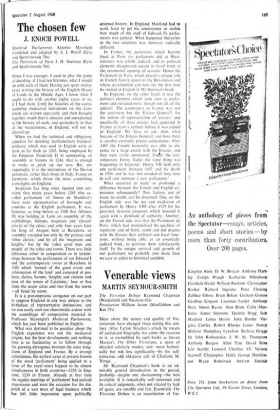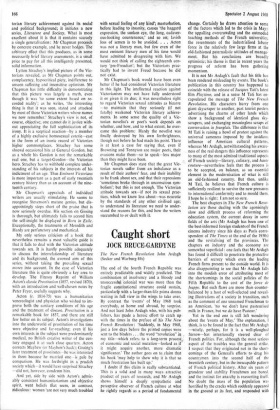The Victorian Debate Raymond Chapman (Weidenfeld and Nicolson 42s)
Venerable views
MARTIN SEYMOUR-SMITH
Prostitution William Acton (MacGibbon and Kee 75s)
Ideas about the nature and quality of Vic- torianism have changed twice during this cen- tury. After Lytton Strachey's attack by means of acidulated biography has come the reaction to it, as exemplified by such books as Steven Marcus's The Other Victorians, a spate of detailed scholarly studies, and—more batheti- cally but not, less significantly—by the self- conscious and old-pussy cult of Charlotte M. Yonge.
Mr Raymond Chapman's book is an ad- mirable general introduction to the period, probably—despite one shortcoming—the best available. It is remarkably well informed and its critical judgments, when not vitiated by lack of space, are Sensible and fair. Essentially The Viciorian Debeite is an examination of Vic-
torian literary achievement against its social and political background; it initiates a new series, Literature and Society. What is most excellent about it is that it contains scarcely a single generalisation : Mr Chapman proceeds by concrete example, and he never hedges. The
effect that this produces, as in some necessarily brief literary assessments, is a small price to pay for all this intelligently presented, solid information.
Lytton Strachey's implied picture of the Vic- torians revealed, as Mr Chapman points out, complacency, hypocritical piety, indifference to unseen suffering and insensitive optimism. Mr Chapman has little difficulty in demonstrating that this picture was largely a myth, even though it was `to some extent based on re- corded reality'; as he writes, 'the interesting thing is that it was seen, stated and attacked by most of those Victorian writers whose names we now remember.' Strachey's view is not, of course, objective; one cannot do it justice with- out appreciating the full sophistication of its irony. It is a sceptical reaction—by a member of a highly exclusive homosexual coterie—cast in the form of an ironic record of Victorian higher commonplaces. Strachey has some shrewd occasional hits at General Gordon, but as a whole his Gordon is not the remarkable real one, but a target-Gordon—the Victorian hero. Strachey has to withhold complete under- standing of his subjects in the interests of his indictment of an age. Thus Eminent Victorians is more important as a part of early twentieth century history than as an account of the nine- teenth century.
Mr Chapman's appraisals of individual writers are usually stimulating. He seems to recognise Stevenson's mature genius, but dis- appointingly stops short of the praise that is now seriously overdue. His section on Gissing is thorough, but ultimately fails to accord him the self-insight he displayed in Born in Exile. Exceptionally, the treatments of Meredith and Hardy are perfunctory and mechanical.
My only serious criticism of a book that nevertheless remains a most valuable guide is that it fails to deal with the Victorian attitude towards sex. It is hardly possible adequately to discuss the interrelationship of literature and its background, the avowed aim of this series, without taking the prevailing sexual mores into account. In the case of Victorian literature this is quite obviously a key area to develop. The Fitzroy Reprint of William Acton's classic Prostitution (1857, revised 1870), with an introduction and well-chosen notes by Peter Fryer, usefully suggests why.
Acton (c. 1814-75) was a humanitarian venereologist and physician who wished to im- prove both the sanitary conditions of his age and the treatment of disease. Prostitution is a remarkable book for 1857, and there are still few better on its subject. Acton's investigations into the underworld of prostitution of his time were objective and far-reaching; even if his own interests in the subject were predominantly medical, no British creative writer of the cen- tury engaged it at such close quarters. Acton corrects Mayhew (or Mayhew's hack); Gissing's later treatment of prostitutes—he was interested in them because he married one—is pale by comparison. He was forthright in a prudish society which—it would have surprised Strachey. —did not, however, condemn him.
Anti yet, side by side with Acton's admir- ably consistent humanitarianism and objective spirit, went beliefs that seem, in contrast, ridiculous: women 'are not very much troubled with sexual feeling of any kind': masturbation, before leading to insanity, causes 'the haggard expression, the sunken eye, the long, cadaver- ous-looking countenance,' and so on; lavish loss of semen is to be avoided. . . . Acton was not a literary man, but few even of the most eminent literary men of his time would have admitted to disagreeing with him. We would not think of calling the eighteenth cen- tury 'pre-Freudian'; but the Victorians prac- tically had to invent Freud because he did not exist.
Mr Chapman's book would have been even better if he had considered Victorian literature in this light. The intellectual reaction against Victorianism may not have fully understood it or given it its due; it was nevertheless right to regard Victorian sexual attitudes as bizarre —to maintain that they seriously (if not fatally) weakened Victorian literary achieve- ments. In some sense the quality of a Vic- torian novelist's or poet's work depends on whether, and how, and to what extent, he over- came this problem : Hardy the novelist was finally destroyed by his own forthrightness, though not before he had made his point. There is at least a case for saying that, even if Browning and Tennyson are major poets, their evasions make them—so to speak—less major than they might have been.
Mr Chapman does state that the great Vic- torian novels suffer from an imbalance as a result of their authors' fear, and their inability to be frank about sex, and that their repressions `sometimes broke through in unconscious sym- bolism'; but this is not enough. The Victorian attitude towards sex—if not its sexual prac- tices, which we know less about—was neurotic by the standards of any other civilised age; to understand its literature we need to under- stand the reasons for this, and how the writers succumbed to or dealt with it.







































 Previous page
Previous page